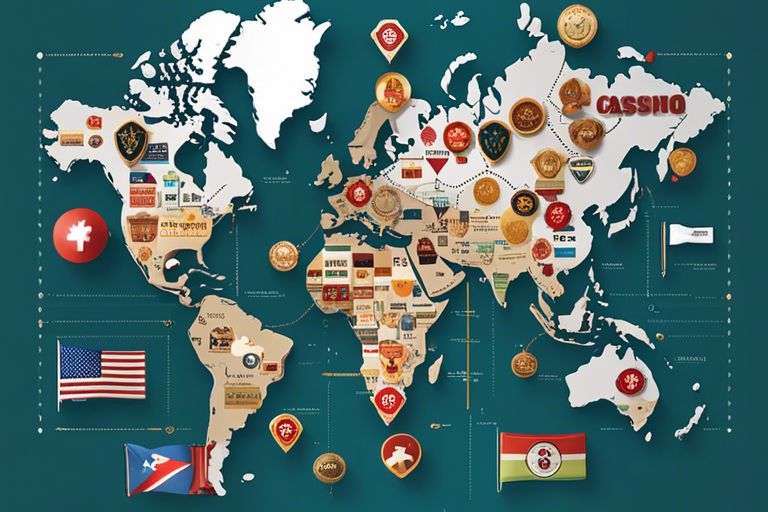Differences in Casino Licensing by Country

A look into the intricate differences in casino licensing regulations across various countries and understand the implications for both operators and players. From the strict regulations in the United States to the more liberal approach in European countries, compliance with diverse licensing requirements is essential for the success and legitimacy of any gambling establishment.
Casino Licensing in North America
To understand the differences in casino licensing in North America, it is important to examine the licensing procedures and regulations in the United States and Canada.
United States
One of the most important aspects of casino licensing in the United States is that each state has its own regulatory body responsible for issuing licenses and overseeing operations. This means that the regulations and requirements for obtaining a casino license can vary significantly from one state to another. In general, the process involves a thorough background check of the applicant, financial due diligence, and compliance with strict gaming laws. Additionally, tribal casinos are subject to separate regulations established by tribal gaming authorities.
One of the more challenging aspects of casino licensing in the United States is the high level of scrutiny and compliance required, as well as the potential for intense competition for licenses in certain markets. The potential rewards of successfully obtaining a casino license in the United States are substantial, given the size and profitability of the market.
Canada
One of the key differences in casino licensing compared to the United States is that Canada does not have separate regulatory bodies for each province. Instead, the provincial governments oversee casino licensing and regulation within their respective jurisdictions. This means that the regulatory framework for casinos can differ significantly from one province to another.
Canada has a reputation for maintaining stringent standards for casino licensing, ensuring that operators adhere to strict regulations regarding responsible gambling, player protection, and anti-money laundering measures. The positive aspect of this centralized approach is the consistency and uniformity in regulatory standards across the country, which can provide more clarity and stability for operators.
Casino Licensing in Europe
If you’re a casino enthusiast, you might be curious about the differences in casino licensing across countries. In Europe, casino licensing varies greatly from one country to another, with each nation having its own set of regulations and requirements.
United Kingdom
Casino licensing in the United Kingdom is overseen by the UK Gambling Commission, which is known for its strict regulatory standards. Any casino operator looking to offer services to UK customers must obtain a license from the Commission, ensuring that they meet the highest standards of fairness, security, and player protection. The UK Gambling Commission also imposes stringent rules on advertising and promotions to prevent irresponsible marketing practices.
The regulatory framework in the United Kingdom has made it one of the most desirable markets for casino operators, as the rigorous licensing process instills confidence in both players and industry stakeholders. However, the high taxes imposed on casino operators can be a significant drawback for businesses seeking to enter the market.
Italy
The Italian casino licensing regime is governed by the Agenzia delle dogane e dei monopoli (ADM), which oversees the regulation and licensing of gambling activities in the country. The ADM issues licenses for various types of casino games, including online gambling, and imposes strict requirements on operators to ensure compliance with anti-money laundering and player protection regulations.
Licensing in Italy is a lengthy and complex process, with operators facing numerous bureaucratic hurdles and high fees. However, the Italian casino market presents lucrative opportunities for operators due to the country’s large population of avid gamblers and its growing demand for online gaming services.
Casino Licensing in Asia
Keep in mind that the casino licensing regulations in Asia vary widely from country to country, with each jurisdiction having its own set of rules and requirements. Understanding the differences in casino licensing by country is crucial for operators looking to enter the Asian market.
Macau
To operate a casino in Macau, operators must obtain a gaming concession or sub-concession from the government. The process is highly regulated and competitive, with the government closely scrutinizing the financial stability and integrity of the applicants. Macau is often referred to as the “Gambling capital of the world,” and the government places great emphasis on maintaining the region’s reputation as a world-class gaming destination. The stringent licensing process ensures that only reputable operators are allowed to participate in the market, which in turn safeguards the interests of both the government and consumers.
To further strengthen the oversight of the casino industry, the Gaming Inspection and Coordination Bureau (DICJ) oversees all gaming activities in Macau and is responsible for enforcing compliance with gaming laws and regulations. Strict anti-money laundering measures are also in place to prevent any illicit financial activities within the casinos. These stringent regulations contribute to Macau’s reputation as a well-regulated and secure gaming jurisdiction.
Singapore
With the introduction of the Casino Control Act in 2006, Singapore opened its doors to the casino industry. The regulatory framework in Singapore focuses on ensuring social safeguards while maintaining a competitive and economically vibrant industry. The Casino Regulatory Authority of Singapore (CRA) oversees the implementation of the Casino Control Act and ensures that the casinos operate in a manner that upholds the integrity of the industry.
Plus, the Singaporean government imposes an entry levy on its citizens and permanent residents to discourage problem gambling and promote responsible gaming. This levy also serves as a source of revenue for the government, contributing to the funding of social safeguards and programs aimed at mitigating the negative impacts of gambling. The combination of stringent regulatory oversight and social safeguards has established Singapore as a well-respected and socially responsible gaming jurisdiction in Asia.
Impacts of Different Licensing Regimes
After exploring the various casino licensing regimes in different countries, it is evident that these regimes have significant impacts on the economy and society. The specific regulations and requirements imposed by each licensing regime can shape the overall landscape of the casino industry in a particular country.
Economic Impacts
To begin with, the economic impacts of casino licensing regimes are substantial. In countries with stringent licensing requirements and high tax rates, the cost of entry into the market is elevated, which can limit the number of casinos operating within the country. On the other hand, countries with more relaxed licensing regimes may experience an influx of casino establishments, leading to increased competition and potential market saturation.
Moreover, tax revenues generated from casino operations vary significantly depending on the licensing regime. Some countries impose higher tax rates on casino revenues, contributing substantial amounts to the government coffers. However, excessive tax burdens can also hinder industry growth and investment, ultimately impacting the overall economy.
Social Impacts
Any discussion of casino licensing regimes would be incomplete without addressing the social impacts. The prevalence of gambling addiction and related issues is influenced by the regulations set forth by the licensing regimes. Countries with stricter regulations may see a lower prevalence of gambling-related problems, while those with more lenient regimes might experience a higher incidence of social issues associated with gambling.
For instance, in countries with stringent licensing requirements, casino operators are often required to contribute to programs aimed at mitigating gambling addiction and promoting responsible gambling practices. However, in countries with lax licensing regimes, such measures may be lacking, potentially leading to negative social consequences.
Conclusion
Following this exploration of casino licensing by country, it is evident that there are significant differences in the regulatory frameworks and processes employed by different nations. While some countries have strict and rigorous licensing requirements, others have more lenient and permissive approaches. These variations can impact the quality and integrity of the gambling industry within each country, as well as the level of protection afforded to players. It is crucial for both operators and players to be aware of these differences in casino licensing when engaging in the global gambling market, and for regulators to continue working towards harmonizing standards to ensure a fair and safe gaming environment for all.
FAQs:
How do casino licensing regulations differ between the United States and Canada?
In the United States, each state has its own regulatory body, leading to significant variations in licensing procedures. In Canada, provincial governments oversee licensing, ensuring consistent standards across jurisdictions.
What distinguishes the United Kingdom’s casino licensing process?
The UK Gambling Commission enforces strict standards for fairness and player protection. Operators must meet high criteria, making the UK a desirable market despite challenges like high taxes.
What challenges do operators face in Italy’s casino licensing process?
Italy’s licensing, governed by ADM, involves complex procedures, bureaucratic hurdles, and high fees. Yet, the market offers lucrative opportunities due to a sizable population of avid gamblers.
How does casino licensing in Macau contribute to its reputation as the gambling capital?
Macau requires a stringent government-granted concession, ensuring financial stability and integrity. The Gaming Inspection and Coordination Bureau enforces compliance, fostering a secure gaming environment.
What distinguishes Singapore as a socially responsible gaming jurisdiction in Asia?
Singapore’s Casino Control Act, overseen by CRA, emphasizes social safeguards and responsible gaming. Entry levies discourage problem gambling and contribute to funding social programs.
Michael
With over 20 years experience in web design, SEO and website promotion I always give you an expert advice in regard to any issues related to your Site Design, SEO, Internet Marketing, Promotion, Backlinks, Site Content. In order to help you find out what is missing or can be improved and get higher rankings in Google and more traffic.
Recommended Posts

Legal Nuances of Operating an Online Casino
May 17, 2024

Enhancing Payment Security with Blockchain
May 17, 2024

Key Factors in a Successful Online Casino
May 17, 2024




